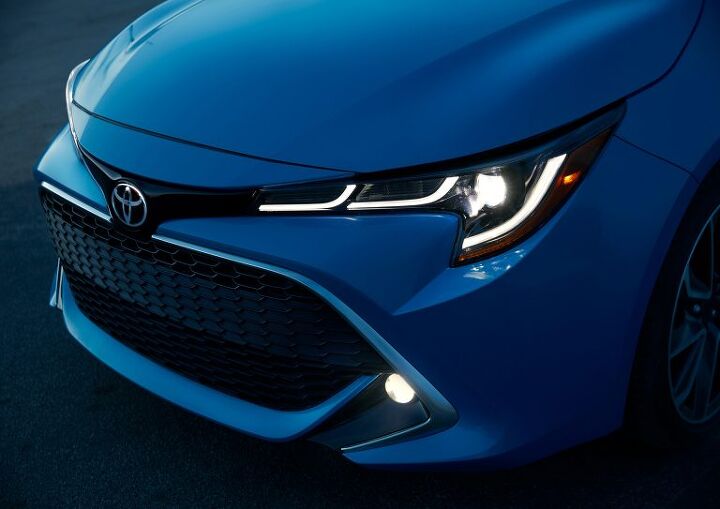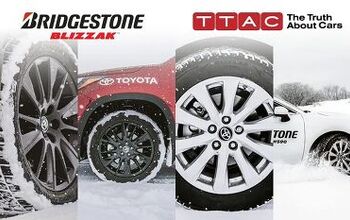Toyota's Trying to Remain Non-threatening in the U.S.

While the Trump administration is carefully considering whether or not imported vehicles qualify as a threat to national security, and prepares for trade negotiations with Japan, Toyota is being very careful about how it comes across in America. Last week, the automaker announced plans to add about 600 jobs across the Southern United States — raising its proposed American expansion by another $749 million. In total, the company is expected to expend $13 billion inside the U.S. by 2022.
“In a time when others are scaling back, we believe in the strength of America and we’re excited about the future of mobility in America,” Jim Lentz, CEO of Toyota Motor North America, said of the decision.
Throwing some casual shade at other automakers who are cutting down their domestic workforce is a sound PR strategy but, according to Toyota, its increased investment has nothing to do with global or industrial politics.
“We’ve been part of the cultural fabric in the U.S. for over 60 years,” Chris Reynolds, Toyota Motor North America’s chief administrative officer for manufacturing and corporate resources, was reported to have said on March 14th by Automotive News. “In a time when others are scaling back, we believe in the strength of America.”
Sounds like Toyota believes in the strength of America… and doesn’t want any of it focused against the business.
CEO Akio Toyoda spoke to Washington on Friday, reportedly claiming discussion of imported vehicles as a security threat makes him “feel sad.” But Toyota has pledged its support of a new trade agreement between the United States, Mexico and Canada, and was eager to see productive negotiations begin between Japan and America.
From Automotive News:
Toyota, whose American factory work force has grown to be about half the size of GM’s, could soon find itself forced to invest even more in the U.S. if it wants to avoid tariffs that would raise the prices of some vehicles. Reynolds and CEO Jim Lentz said they are eager to learn whether the Trump administration will indeed declare imported vehicles to be a national security threat and go forward with tariffs, so they can determine whether additional production needs to be shifted.
But they also said the company, which imports about half of its U.S. sales volume, won’t make any knee-jerk decisions either way.
“Our investment cycles go beyond any particular political cycle. We need to make decisions based on what we think the market needs rather than the policy direction of the moment,” Reynolds said. “All of this activity, I hope, shows that we’re a plus factor to the economic national security of the United States.”
Back in 2017, Toyota said it planned on investing $10 billion into its North American operations over five years. Since then, that sum has climbed to $13 billion. Toyota also recently said it would utilize the $749 million to expand facilities and/or add jobs in Huntsville, AL; Buffalo, WV; Jackson, TN; Georgetown, KY; and Troy, MO.
[Image: Toyota]

A staunch consumer advocate tracking industry trends and regulation. Before joining TTAC, Matt spent a decade working for marketing and research firms based in NYC. Clients included several of the world’s largest automakers, global tire brands, and aftermarket part suppliers. Dissatisfied with the corporate world and resentful of having to wear suits everyday, he pivoted to writing about cars. Since then, that man has become an ardent supporter of the right-to-repair movement, been interviewed on the auto industry by national radio broadcasts, driven more rental cars than anyone ever should, participated in amateur rallying events, and received the requisite minimum training as sanctioned by the SCCA. Handy with a wrench, Matt grew up surrounded by Detroit auto workers and managed to get a pizza delivery job before he was legally eligible. He later found himself driving box trucks through Manhattan, guaranteeing future sympathy for actual truckers. He continues to conduct research pertaining to the automotive sector as an independent contractor and has since moved back to his native Michigan, closer to where the cars are born. A contrarian, Matt claims to prefer understeer — stating that front and all-wheel drive vehicles cater best to his driving style.
More by Matt Posky
Latest Car Reviews
Read moreLatest Product Reviews
Read moreRecent Comments
- Probert They already have hybrids, but these won't ever be them as they are built on the modular E-GMP skateboard.
- Justin You guys still looking for that sportbak? I just saw one on the Facebook marketplace in Arizona
- 28-Cars-Later I cannot remember what happens now, but there are whiteblocks in this period which develop a "tick" like sound which indicates they are toast (maybe head gasket?). Ten or so years ago I looked at an '03 or '04 S60 (I forget why) and I brought my Volvo indy along to tell me if it was worth my time - it ticked and that's when I learned this. This XC90 is probably worth about $300 as it sits, not kidding, and it will cost you conservatively $2500 for an engine swap (all the ones I see on car-part.com have north of 130K miles starting at $1,100 and that's not including freight to a shop, shop labor, other internals to do such as timing belt while engine out etc).
- 28-Cars-Later Ford reported it lost $132,000 for each of its 10,000 electric vehicles sold in the first quarter of 2024, according to CNN. The sales were down 20 percent from the first quarter of 2023 and would “drag down earnings for the company overall.”The losses include “hundreds of millions being spent on research and development of the next generation of EVs for Ford. Those investments are years away from paying off.” [if they ever are recouped] Ford is the only major carmaker breaking out EV numbers by themselves. But other marques likely suffer similar losses. https://www.zerohedge.com/political/fords-120000-loss-vehicle-shows-california-ev-goals-are-impossible Given these facts, how did Tesla ever produce anything in volume let alone profit?
- AZFelix Let's forego all of this dilly-dallying with autonomous cars and cut right to the chase and the only real solution.


































Comments
Join the conversation
It was tariffs that got foreign automakers to build plants in the US in the 80's. Harley got a tariff. The current (2015?) tire tariff expires next year, I think. IMO, tariffs are generally bad, but one sided tariffs that take advantage of the US are worse. It's insane to bash Trump for trying to even the playing field. All previous administrations did the same.
I don't really care where the manufacturer is based. I would rather have a Japanese or South Korean based manufacturer that employs Americans than an allegedly American based manufacturer that manufactures in China. Do you honestly believe that Barra or the credenza guy care anymore about the American worker than a Japanese manufacturer?